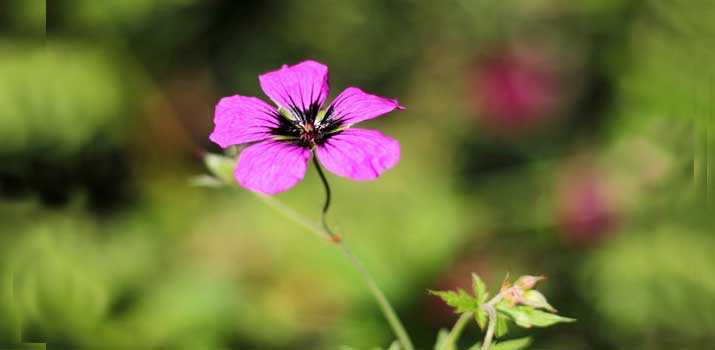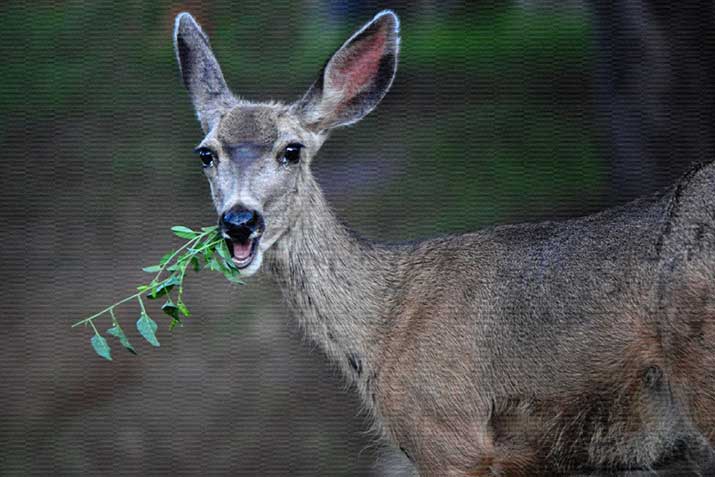With their potent, pretty fragrance and big, bushy blooms, geraniums are beloved by humanity. They can brighten up a space significantly, and even catching a glimpse of them can put a smile on your face.

Thankfully, though, deer don’t feel the same way. The strong smell, bitter taste, and often quite fuzzy texture of geraniums does not appeal to deer in the slightest.
They’re usually more hungry for hostas, ravenous for roses, piggish for tulips, and starving for strawberries. However, if it’s slim pickings on all other accounts, a deer may well chow down on your painstakingly cultivated geraniums — Noooo!
The good news is that there are a number of ways to stop such a tragedy from ever taking place, and I’m going to be discussing them all. But first, let’s think about why and when deer might dine out on a plant they don’t even like.
When Will Deer Eat Geraniums?
Deer are opportunistic eaters, so as long as something isn’t toxic, they’ll give it a go, but in the case of geraniums, they’ll likely only take a bite if circumstances force them too.
For instance, during the colder seasons when food is sparse in the wild, they’re more likely to venture into your yard for a quick snack, and if geraniums are all that’s there, it’s geraniums they eat… begrudgingly of course.
But winter isn’t the only issue. Bambi might also gobble up some of your geraniums by accident if they just happen to be near one of the plants they do enjoy eating, so it might be best to keep these plants separate.
And if you’re wondering what these preferred plants are, here’s a list:
- Hostas
- Daylily
- Pansies
- Dhalia
- Tulips
- Sunflowers
- Snowdrops
- Gerbera
- Crocus
- Lilyturf
- Rose mallow
- Cosmos
- Impatiens
This isn’t an exhaustive list, as deer have broad tastes, but these are some of their absolute favorites. If you have these in your garden, you may need to shield them with a wall of less-appetizing flora to keep the beasts at bay.
How To Keep Deer From Eating Your Geraniums?
While you shouldn’t have too much trouble keeping deer away from your gorgeous geraniums, if you don’t want to take any chances, consider using one or more of the deterrents detailed below.
They vary in efficacy and affordability, so be sure to weigh up both factors as you read.
Deer Repellant
The cheapest way to keep deer at arm’s length is to formulate a homemade repellant. There are countless recipes online you can use, but before you raid your cupboards for ingredients, you need to know a few things.
Deer already dislike the smell of geraniums, so masking it with something they also don’t like isn’t going to be as effective as it would on other plants. What’s more, there is no single repellant that’s going to work everywhere all the time.
Even pre-mixed repellant bought at the store will vary in impact from product to product, meaning you’ll probably have to try a fair few before you find the one that does the trick.
Also, repellant wears off pretty quickly, especially in bad weather, so you have to continually apply it to keep wildlife at bay.
Scare Tactics
You can purchase both sprinkler systems and alarms that link up to a motion sensor. If you place the sensor by your geraniums, either the sprinkler system or alarm will kick into action, thus scaring the hungry deer away.

It’s a much more effective approach, but they may figure out what’s going on after multiple failed attempts to eat your flowers.
They’ll grow braver with each visit, and eventually, they might understand that nothing bad actually happens if they stick around and have a bite.
You can, however, keep them guessing by switching between an alarm and a sprinkler system and changing the location of the sensor.
Organic Barriers
There are plenty of plants that deer hate even more than geraniums, so if you want to block access without installing any eyesore features like tall fences, I’d recommend forming an organic barrier composed of their least favorite flora. These include:
- Chives
- Daffodils
- Lamb’s ear
- Bleeding heart
- Marigolds
- Russian sage
- Bee balm
- Oregano
- Iris
- Barrenwort
- Basil
- Lavender
Get Primal
If you have a dog or dogs, let them hang out in your yard whenever possible, as the mere sight of them will keep wildlife away, but be warned, dogs can cause their own signature brand of chaos in a garden.
Should you not have dogs or not trust them in your lovely outdoor space, next time you clean your hairbrush, instead of throwing the dead hair away, scatter it around your geraniums. Use dog hair as well if you can, as deer hate it.

Diversify Your Topography
This is a pretty drastic move, but if you feel like giving your yard a facelift anyway, it could just encourage you to finally go ahead and do it. Deer don’t like difficult-to-traverse, man-made land.
If there are lots of tiers and steps about, they’ll instinctively know to stay away, as they wouldn’t be able to make a quick escape from a predator.
This is a good move if you already have a small fence, because if they have to jump into a varied landscape, there’s far more chance they’ll injure themselves, and so, will probably go and eat your neighbor’s flowers instead — Sorry, not sorry, Barbara!
Fencing
Still no luck keeping those toothy ungulates away? I’m afraid it’s time to bring out the big guns fences.
I’m sure you already assume that deer are adept jumpers, but you probably don’t quite understand just how gravity-defying these athletic creatures can be.
To stop a full-grown deer from leaping into your yard, I’d recommend installing a 7.5-foot fence at the very minimum.
Some choose electric fences, but this will cost you, and it’s not nice having a bunch of hazard warning signs dotted around your otherwise idyllic yard. Besides, it’s the height of a fence that stops deer in their tracks, not the voltage.
However, if you feel like electricity is your only choice, be sure to choose something greater than 4000 volts, otherwise, the deer won’t even bat an eyelid.
More Deer Facts:
Final Thoughts
It can be tricky keeping deer away from the plants they consider delicacies, but thankfully, geraniums aren’t one of them.
Their natural distaste for these beautiful flowers, combined with one of the deterrents detailed above, is sure to banish them from your yard.
And if it’s too late and deer have already ravaged your geraniums, don’t sweat it. Both annual and perennial geraniums are resilient, and as long as you can keep deer away for the time being, they’ll grow back.
